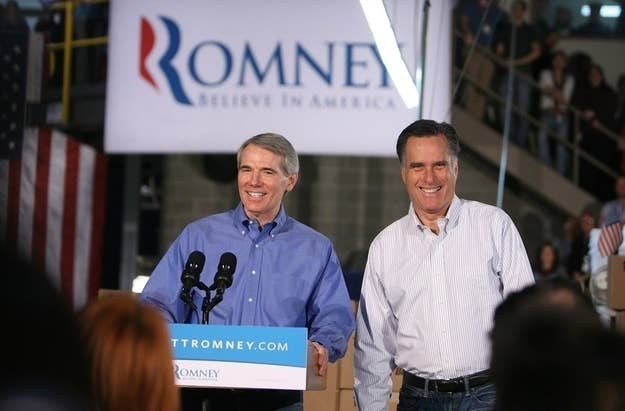
Ohio Senator Rob Portman — a former top Bush economic official seen as a contender for the vice presidential nomination — is calling on both President Barack Obama and his ally Mitt Romney to detail their plans for taxing and spending before a presidential election that will be followed immediately by big choices about the size and scope of American government.
Portman said in an interview with BuzzFeed that both Obama and Romney face the risk of a fiscal “train wreck” at the end of this year, and said they need to answer a straightforward question before the election: “What's your plan?”
“I count actually a dozen things and a lot of them are tough issues that have been kicked down the road that have to be dealt with in about six weeks after the election,” Portman said.
Portman’s blunt warning marks an election with about a dozen major issues looming, a scenario referred to by alarmed policy wonks alternately as “the fiscal cliff” or “taxmageddon.”
Lawmakers will have to decide how to extend the Bush Tax Cuts (on everyone, or just middle and low incomes); whether to roll back the “sequester” penalty brought about by the failed “super committee” that would impose cuts on Department of Defense; and whether maintain the payroll tax cut which the administration says has helped create over 500,000 jobs. They also need to raise the debt ceiling to avoid default and paying for it to meet Republican demands; to “fix” Medicare payouts so doctors don’t see sharp reductions in what they get for treating older patients; decide whether or not to extend long-term unemployment insurance; and to prevent the Alternative Minimum Tax to prevent it from hitting six times as many taxpayers.
“This is probably unlike any other modern presidential election in that there are a handful of very discrete issues that absolutely must be dealt with immediately, and it’s not like they can be dispensed with or ignored,” said Tony Fratto, a spokesman for the Treasury Department in the Bush Administration.
“Almost everyone wishes they can push these issues off until after the election,” he said. “What they don’t realize is that they’ll have to deal with these issues in real time on the campaign trail.”
The Obama campaign is gearing up for the “inevitable" discussion of the looming fiscal issues as well, a senior advisor told BuzzFeed.
“Are we going to go down the road that these guys suggest — huge, trillions and trillions of dollars of new tax cuts skewed to the wealth, more spending on defense, and massive cuts to virtually everything else? It's out of balance, and I think people are looking for a balanced approach. It's inevitable that we're going to be talking about this,” the advisor said.
Portman said in the interview that he anticipated an early fight over the federal debt limit. Raising it nearly shut down the government in August of last year, as Republicans demanded offsetting spending cuts.
“The ability to have Congress pass another debt limit increase is going to be depending on Congress getting serious about spending, because I think a lot of Republicans are not going to vote to extend the debt limit unless there is some serious commitment on spending.” Portman said. “And that's got to include looking at not just the annual appropriations in this process, but the bigger part of the budget, which is the mandatory spending.”
And Portman, who ran the Office of Management and Budget in the Bush Administration, warned that a weaker economy would mean less money to go around.
“The Fed is talking about having a three percentage point hit to the GDP, and most people don't think our GDP is going to be growing at three percent, so that by definition is negative growth. And each percentage point is about a million jobs. This is a big deal,” he said.
Portman, who Republicans see as a capable spokesman on economic issues, said the coming decisions would likely become the focus of presidential debate.
“All this stuff is related, and it will be a topic of debate, either directly or indirectly, because they have no choice,” he said.
